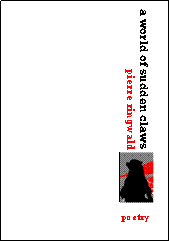 Eyewear wishes to congratulate Pierre Ringwald, whose new collection (cover pictured here), A World of Sudden Claws, from The Tall-Lighthouse press is the Poetry Book Society's Pamphlet Choice for spring 2006.
Eyewear wishes to congratulate Pierre Ringwald, whose new collection (cover pictured here), A World of Sudden Claws, from The Tall-Lighthouse press is the Poetry Book Society's Pamphlet Choice for spring 2006.Ringwald was born in Edmonton in Western Canada in 1971, but spent over 20 years in Ottawa where he was active member of the local arts community as a drummer, dj and performance poet.
He relocated to London in the summer of 2001, accepting a teaching post in the English department of St. Gregory’s RC Science College in Brent.
When he isn’t teaching, he divides his time between writing, performing, and djing. According to his bio he "misses snow".
Eyewear will be running a Friday Feature on Ringwald later this month. In the meantime, read the book.
Comments